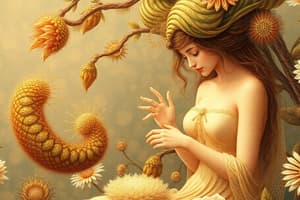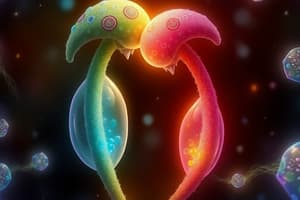Podcast
Questions and Answers
What is the primary function of reproduction in organisms?
What is the primary function of reproduction in organisms?
- To enhance the organism's ability to adapt to new environments
- To ensure the species' survival (correct)
- To increase the size of individual organisms
- To rid the body of unwanted materials
Asexual reproduction involves the fusion of gametes from two parents.
Asexual reproduction involves the fusion of gametes from two parents.
False (B)
What type of cell division is involved in gamete production?
What type of cell division is involved in gamete production?
Meiosis
In sexual reproduction, the male gamete, or sperm, fertilizes the female gamete, or _____, to create a fertilized zygote.
In sexual reproduction, the male gamete, or sperm, fertilizes the female gamete, or _____, to create a fertilized zygote.
Match the following reproductive organs with their corresponding gametes:
Match the following reproductive organs with their corresponding gametes:
During which stage of reproduction does the zygote develop into an embryo and then a fetus?
During which stage of reproduction does the zygote develop into an embryo and then a fetus?
The term 'pubertas,' from which the term puberty is derived, means 'the age of womanhood'.
The term 'pubertas,' from which the term puberty is derived, means 'the age of womanhood'.
What is the landmark event of puberty for females, marking the beginning of menstrual cycles?
What is the landmark event of puberty for females, marking the beginning of menstrual cycles?
For males, the first ejaculation, known as Spermarche or _____, typically occurs around age 13.
For males, the first ejaculation, known as Spermarche or _____, typically occurs around age 13.
Match the following descriptions to the correct stages in puberty:
Match the following descriptions to the correct stages in puberty:
What triggers the physical changes that occur during puberty?
What triggers the physical changes that occur during puberty?
Estrogen, a steroid hormone, is only prevalent in biological females.
Estrogen, a steroid hormone, is only prevalent in biological females.
Name the three types of Estrogen.
Name the three types of Estrogen.
Androgens, such as testosterone, are prevalent in biological _____ and are responsible for the development of male characteristics.
Androgens, such as testosterone, are prevalent in biological _____ and are responsible for the development of male characteristics.
Match the following hormones with their described functions:
Match the following hormones with their described functions:
Gynecomastia, erectile dysfunction, and infertility are associated with which hormone level imbalance in men?
Gynecomastia, erectile dysfunction, and infertility are associated with which hormone level imbalance in men?
Virilization, a condition of high testosterone levels in women, can lead to decreased muscle mass.
Virilization, a condition of high testosterone levels in women, can lead to decreased muscle mass.
Name three symptoms that a woman could experience with a buildup of testosterone.
Name three symptoms that a woman could experience with a buildup of testosterone.
An enduring pattern of attraction toward the opposite sex, the same sex, or both sexes refers to one's _____.
An enduring pattern of attraction toward the opposite sex, the same sex, or both sexes refers to one's _____.
Match the following terms to their definitions:
Match the following terms to their definitions:
Human sexuality involves the sexual activity and orientation of a person, but what other aspects are also included?
Human sexuality involves the sexual activity and orientation of a person, but what other aspects are also included?
According to the content, Sexuality only refers to your physical self.
According to the content, Sexuality only refers to your physical self.
A healthy relationship includes lines or limits between you and the world around you, what are these called?
A healthy relationship includes lines or limits between you and the world around you, what are these called?
The best decision one can make in safeguarding sexual health is considered to be _____.
The best decision one can make in safeguarding sexual health is considered to be _____.
Match each item with physical attraction or sexual orientation:
Match each item with physical attraction or sexual orientation:
What is the definition of gender identity?
What is the definition of gender identity?
Factors that do not influence sexual attitudes and behaviors are family, culture, peers, and media.
Factors that do not influence sexual attitudes and behaviors are family, culture, peers, and media.
What is being male or female?
What is being male or female?
A set of roles and characteristics a man or woman should feel, think, and act in as influenced by peers, society and parents is best described as what? A ______ Role.
A set of roles and characteristics a man or woman should feel, think, and act in as influenced by peers, society and parents is best described as what? A ______ Role.
Match the following sexual preferences to their meanings:
Match the following sexual preferences to their meanings:
At what female age range does puberty typically start?
At what female age range does puberty typically start?
Rapid maturers can complete puberty in 3-4 years.
Rapid maturers can complete puberty in 3-4 years.
What are the set of steroid hormones that act as as regulators for sexual development and reproduction?
What are the set of steroid hormones that act as as regulators for sexual development and reproduction?
A condition in women who have high testosterone levels is known as ____.
A condition in women who have high testosterone levels is known as ____.
Match the following
Match the following
Which one of these things are not considered a symptom of high estrogen levels in men?
Which one of these things are not considered a symptom of high estrogen levels in men?
The landmark of puberty for males is Menarche.
The landmark of puberty for males is Menarche.
What does the Latin word 'pubertas' mean?
What does the Latin word 'pubertas' mean?
Sexual attraction between persons of opposite sex is commonly know as _____.
Sexual attraction between persons of opposite sex is commonly know as _____.
Match the following types of attraction with their definitions:
Match the following types of attraction with their definitions:
Flashcards
What is Reproduction?
What is Reproduction?
The biological process through which organisms create new organisms or offspring from their parents; essential for species survival.
What is Sexual Reproduction?
What is Sexual Reproduction?
A type of reproduction involving the interaction of two specialized reproductive cells (gametes) from different parents, resulting in genetic variation in offspring.
What is Asexual Reproduction?
What is Asexual Reproduction?
A type of reproduction where an organism reproduces without another organism's involvement; offspring are genetically identical or similar to the parent. Cloning is a form of this.
What is Gamete Production?
What is Gamete Production?
Signup and view all the flashcards
What is the male reproductive organ?
What is the male reproductive organ?
Signup and view all the flashcards
What is the female reproductive organ?
What is the female reproductive organ?
Signup and view all the flashcards
What is Fertilization?
What is Fertilization?
Signup and view all the flashcards
Embryo and Fetus Development
Embryo and Fetus Development
Signup and view all the flashcards
What is Puberty?
What is Puberty?
Signup and view all the flashcards
What is Menarche?
What is Menarche?
Signup and view all the flashcards
What is Spermarche / Semenarche?
What is Spermarche / Semenarche?
Signup and view all the flashcards
What are Rapid Maturers?
What are Rapid Maturers?
Signup and view all the flashcards
What are Slow Maturers?
What are Slow Maturers?
Signup and view all the flashcards
What is the Prepubescent Stage?
What is the Prepubescent Stage?
Signup and view all the flashcards
What is the Pubescent Stage?
What is the Pubescent Stage?
Signup and view all the flashcards
What is the Postpubescent Stage?
What is the Postpubescent Stage?
Signup and view all the flashcards
What are Sex Hormones?
What are Sex Hormones?
Signup and view all the flashcards
What is Estrogen?
What is Estrogen?
Signup and view all the flashcards
What is Androgen?
What is Androgen?
Signup and view all the flashcards
What is Virilization?
What is Virilization?
Signup and view all the flashcards
What is Sexual Orientation?
What is Sexual Orientation?
Signup and view all the flashcards
What is Heterosexual?
What is Heterosexual?
Signup and view all the flashcards
What is Homosexual?
What is Homosexual?
Signup and view all the flashcards
What is Bisexual?
What is Bisexual?
Signup and view all the flashcards
What is Asexual?
What is Asexual?
Signup and view all the flashcards
What is Gender Orientation?
What is Gender Orientation?
Signup and view all the flashcards
What is Gender Identity?
What is Gender Identity?
Signup and view all the flashcards
What is Gender Equality?
What is Gender Equality?
Signup and view all the flashcards
What is Gender Role?
What is Gender Role?
Signup and view all the flashcards
What is Abstinence?
What is Abstinence?
Signup and view all the flashcards
Study Notes
Reproduction
- It is the biological process by which organisms create new organisms, or offspring, from their parents.
- It is essential for the survival of a species.
Types of Reproduction
- There are 2 main types of reproduction.
- Sexual reproduction involves the interaction of two specialized reproductive cells, called gametes from different parents, and the offspring have genetic characteristics from both parents.
- Asexual reproduction involves an organism reproducing without another organism.
- Offspring are genetically identical or similar to the parent.
- Cloning is a form of asexual reproduction.
Process of Reproduction
- There are three phases in the process of reproduction
- Gametes are created through meiosis, a type of cell division.
- Male reproductive organs, or gonads are called the testis
- Female reproductive organs, or gonads are called the ovary
- Male gametes are called sperm
- Female gametes are called eggs
- Fertilization occurs when the male gamete, or sperm, fertilizes the female gamete, or egg, to create a fertilized zygote.
- The zygote develops into an embryo and then a fetus.
Puberty
- Puberty is the process of physical changes through which a child's body matures into an adult body capable of sexual reproduction.
- The word puberty comes from the Latin word "pubertas" which means the age of manhood.
Timing of Puberty
- Females begin puberty around the age of 10½ and complete puberty at ages 15-17.
- Menarche (the beginning of the menstrual period) is a landmark of puberty for females around 12½ - 14 years old.
- Males generally begin puberty at ages 11½-12 and complete puberty at ages 16-17.
- In males, Spermarche / Semenarche (first ejaculation) occurs on average at age 13.
Duration of Puberty
- Rapid maturation of puberty occurs in only 2 years or less.
- Slow maturation of puberty occurs in 3-4 years to complete the transformation into adults.
Stages of Puberty
- Prepubescence overlaps the closing year of childhood.
- One is no longer a child, but not yet an adolescent.
- The secondary sex characteristics begin to appear, but the reproductive organs are not yet fully developed.
- Pubescence is at the dividing line between childhood and adolescence, which is when the criteria of sexual maturation appear.
- Secondary sex characteristics continue to develop, and cells are produced in the sex organs.
- Postpubescence overlaps the first year of adolescence.
- Secondary sex characteristics become well-developed and sex organs begin to function maturely.
Hormones and Puberty
- Sex hormones are steroid hormones that regulate sexual development and reproduction.
- These include gonadocorticoids, gonadal steroids, and sex steroids.
- Estrogen is prevalent in biological females.
- Estrogen helps bring about the physical changes that turn a girl into a woman, this time of life is called puberty.
- These changes include growth of the breasts and pubic and underarm hair, and the start of menstrual cycles.
- Estrogen helps control the menstrual cycle and is important for child bearing.
- In women and men, estrogen helps control sexual desire, erectile function, lipid metabolism, brain function, bone health and skin health
- The ovaries, which produce a woman's eggs, are the main source of estrogen from her body.
- Fat tissue and adrenal glands (located at the top of each kidney) make small amounts of the hormone.
Types of Estrogen
- Estradiol is the most common type in women of childbearing age.
- Estriol is the main estrogen produced during pregnancy.
- Estrone is the only estrogen the body makes after menopause.
- Androgens are prevalent in biological males.
Effects of Testosterone
- Within bones, testosterone allows bone mass density maintenance.
- Within muscles, testosterone allows muscle growth, increased strength and increased endurance.
- Within the skin, testosterone encourages hair growth and collagen growth.
- Within the brain, testosterone increases the sex drive, improves mood, increase confidence and maintains memory function.
- Within the bone marrow, testosterone allows a boost of red blood cell production.
- Within the sex organs, testosterone allows Sperm production, Erik tile function and Prostate growth.
High Estrogen in Men
- The condition of Gynecomastia - breast tissue enlargement.
- Erectile dysfunction, along with infertility, and depression.
- Delayed puberty, weight gain, and fatigue.
- Short stature, brain fog, and general insomnia.
- Mood swings, general irritability, and low libido.
High Testosterone in Women
- Virilization is the development of male physical characteristics.
- Examples include in increased muscle mass; body hair on the face, chest, or back; a deepening of the voice; enlarged clitoris; and decreased breast size.
- Also, mood symptoms, as well as irritability, bloating, and pelvic cramping.
- There are reproductive health issues, such as irregular or even absent periods.
- Can lead to high blood pressure, high blood sugar levels, high cholesterol or triglyceride levels, and excess body fat.
- There is an increased risk of cancer specifically uterine cancer.
Human sexuality
- Everyone is a sexual being, and sexuality affects who we are and how we express yourselves as sexual beings.
- Sexuality is all about our bodies, our sex, our gender, sexual activity, sexual orientation as well as our sexual drives
- Also, the values, attitudes, beliefs, and ideals about life and love, not to mention healthy relationships.
- Sexuality refers to one's total self
- Refers to a physical self like the way we look as a man or a woman.
- It refers to the mental self like the way we think as a man or a woman.
- It refers to the social self, such as the way we interact with others.
- Also, the emotional self, such as how one feels about themselves and others.
- Concluding with the ethical self, or the way we value relationships.
Healthy relationships
- Healthy relationships are those that set boundaries by communicating what you are, and aren't comfortable with.
- These boundaries are considered emotional, physical, and mental rules of respect that you set between yourself and someone else.
- Boundaries are described to be guidelines that ensure wellness, comfort, and safety with another person
- Boundaries can be flexible and change over time, as the relationships in your life develop and grow.
Sexual Orientation
- Sexual orientation refers to that enduring pattern of attraction—emotional, romantic, sexual.
- Some combine these to the opposite sex, the same sex, or both sexes.
- Types of sexual orientation include heterosexual, homosexual, bisexual, and asexual.
- Heterosexual is romantic or sexual attraction or behavior between people of the opposite sex.
- Homosexual is romantic or sexual attraction or behavior between members of the same sex or gender.
- Bisexual is romantic or sexual attraction or sexual behavior toward males and females.
- Asexual is the lack of romantic or sexual attraction to others.
Gender
- Gender refers to the social construct on how men and women think, feel, and act.
- Gender can also mean femininity or masculinity.
- Human sexuality can also mean being male or female.
- It's the way that we experience and express ourselves as sexual beings
Gender Equality and Gender Role
- Gender equality means permits man and woman equal enjoyment of human rights.
- Gender role, is a set of roles and characteristics, and expectations of how a man or woman should feel, think, and act, as influenced by parents, peers, and society
Factors Affecting Attitudes and Behavior
- Family
- Culture
- Peers
- Media
Abstinence
- Abstinence is an act that has shown to be the best decision in safeguarding sexual health.
Studying That Suits You
Use AI to generate personalized quizzes and flashcards to suit your learning preferences.




